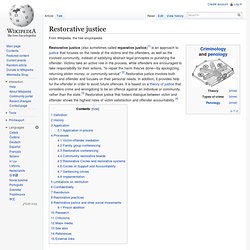

The Modern Transformation of Civil Law - Yale Law Review.
You are liable for the actions of others. The Transformation of Civil Lawyers. The Transformation of the Civil Legal Assistance System 33 Cleringhouse Review 1999-2000. CIVIL LAW AND THE TRANSFORMATION OF STATE PROPERTY IN POST-SOCIALIST ECONOMIES: ALTERNATIVES TO PRIVATIZATION. Andrei A.

Baev * The history of socio-economic progress proves that social relations regarding the production of material goods are primary, and social relations regarding the distribution, exchange, and consumption of material goods are secondary. A society can neither stop producing nor stop consuming. University of Pennsylvania Law Review, Vol. 137, No. 6 (Jun., 1989), pp. 1925-1967. Restorative justice. Restorative justice (also sometimes called reparative justice)[1] is an approach to justice that focuses on the needs of the victims and the offenders, as well as the involved community, instead of satisfying abstract legal principles or punishing the offender.

Victims take an active role in the process, while offenders are encouraged to take responsibility for their actions, "to repair the harm they've done—by apologizing, returning stolen money, or community service".[2] Restorative justice involves both victim and offender and focuses on their personal needs. In addition, it provides help for the offender in order to avoid future offences.
It is based on a theory of justice that considers crime and wrongdoing to be an offence against an individual or community, rather than the state.[3] Restorative justice that fosters dialogue between victim and offender shows the highest rates of victim satisfaction and offender accountability.[4] Definition[edit]